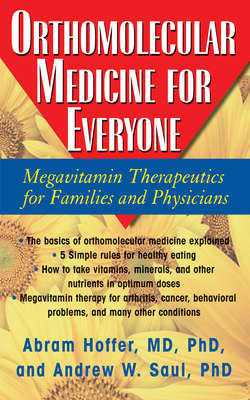Читать книгу Orthomolecular Medicine for Everyone - Abram Hoffer M.D. Ph.D. - Страница 24
На сайте Литреса книга снята с продажи.
ANXIETY DISORDERS (NEUROSES) AND THE SUGAR METABOLIC SYNDROME
ОглавлениеOrthomolecular psychiatry has been interested in the biochemical aspects of the neuroses. These are the diseases caused by malnutrition or faulty nutrition. Neuroses or psychoneuroses are psychiatric diseases that mainly alter mood. These changes are quantitatively different in degree from mood changes that are part of the normal reactions of people. Neuroses bring no perceptual changes (illusions and hallucinations), no thought disorder, and therefore no schizophrenia. Neuroses must also be distinguished from the psychotic depressions and psychoses.
One of the difficulties in diagnosing anxiety is that it is a normal reaction to any illness. Any threat to the health and comfort of any person is apt to generate a good deal of anxiety. It is also a product of most forms of malnutrition. The two most common forms of malnutrition that cause anxiety relate to some of the B vitamins and to the excessive consumption of processed and refined foods. Since any vitamin deficiency will produce one or another form of ill health, it would be logical that a deficiency of any vitamin can cause anxiety. However, the B vitamins seem to be more closely related to anxiety than the other vitamins. Perhaps that is because they are most apt to be needed in extra quantities. The B vitamin–related neuroses will be discussed in Chapter 3.
Another large group of people suffering from depression and anxiety are the ones who overconsume sugars and the other processed or refined foods, such as white bread, pastries, etc. The conditions produced by this type of malnutrition have been called the “saccharine disease,” at least for the physical manifestations of this disease.7 But prior researchers did not include the psychiatric components of this major syndrome. These components are coexistent in such a large proportion of patients that it is rare to find patients with the physical expression of this syndrome, which we call “sugar metabolic syndrome,” who do not also suffer from many of the mood changes typically found in the neuroses. It is more common to find many with serious mood disorders who do not have the physical components. The main difference is that patients whose main symptoms are physical will be more apt to receive somatic treatment, whereas patients whose symptoms are mainly psychiatric are more apt to wind up in the psychiatrist’s office. In both cases, malnutrition is the last thing to be considered, if it is considered at all.
